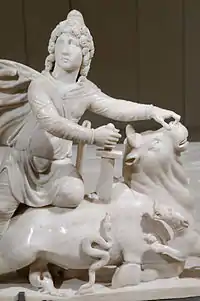Mithras
English

Mithras
Proper noun
Mithras
- A Roman god, cult figure of the 2nd-to-4th-century Roman mystery religion known as the "Mysteries of Mithras" (now colloquially Mithraism)
Derived terms
Latin
Etymology
Probably via Ancient Greek Μίθρας (Míthras) from some unattested Old Iranian intermediary, ultimately from vocative Avestan 𐬨𐬌𐬚𐬭𐬀 (miθra) (cf. Mithra).
Until the 1970s, the character of Roman Mithras was widely assumed to be a continuation of that of Iranian Mithra (and thus also of Indo-Iranian *mitra). This notion is no longer followed today, and it is generally agreed that borrowing (e.g. of the name) does not constitute continuation.
Pronunciation
- (Classical) IPA(key): /ˈmi.tʰraːs/, [ˈmɪt̪ʰräːs̠]
- (modern Italianate Ecclesiastical) IPA(key): /ˈmi.tras/, [ˈmiːt̪räs]
Proper noun
Mithrās m sg (genitive Mithrae); first declension
Declension
First-declension noun (masculine Greek-type with nominative singular in -ās), singular only.
| Case | Singular |
|---|---|
| Nominative | Mithrās |
| Genitive | Mithrae |
| Dative | Mithrae |
| Accusative | Mithrān |
| Ablative | Mithrā |
| Vocative | Mithrā |
References
- “Mithras”, in Charlton T. Lewis and Charles Short (1879) A Latin Dictionary, Oxford: Clarendon Press
- Mithras in Gaffiot, Félix (1934) Dictionnaire illustré latin-français, Hachette.
This article is issued from Wiktionary. The text is licensed under Creative Commons - Attribution - Sharealike. Additional terms may apply for the media files.